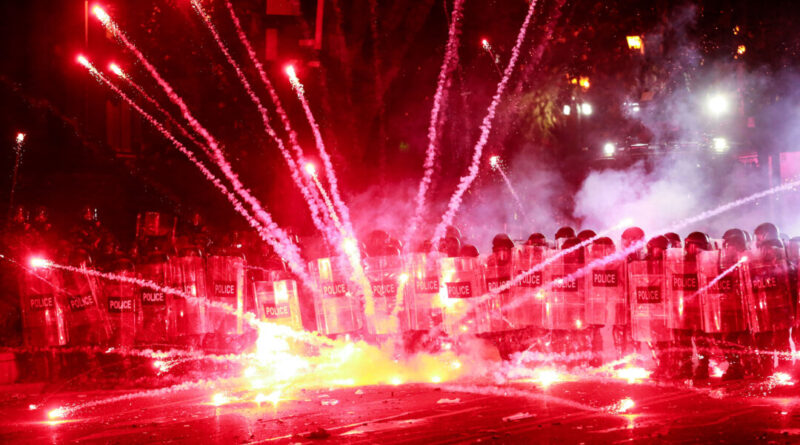The ongoing unrest in Tbilisi continues as the country remains deeply divided over its alignment – whether to lean towards the West or align with Moscow.
Accusations have surfaced against Georgia’s police for the alleged torture of individuals arrested during street protests that have persisted for six days. These demonstrations are in response to the government’s decision to suspend talks regarding joining the European Union.
Protesters gathered in Tbilisi once more on Tuesday evening, indicating no intention of backing down in the face of the standoff. Riot police utilized water cannons and tear gas yet again to disperse the protesters, who retaliated by throwing fireworks and setting up barricades on the main street of the Georgian capital.
Almost 300 protesters have been taken into custody, with 26 individuals, including three police officers, requiring hospitalization due to the violence.
Levan Ioseliani, the nation’s public defender with the mandate to safeguard citizens’ rights, stated that individuals have undergone severe mistreatment at the hands of law enforcement officers.
“The injuries sustained by individuals, particularly in the facial, ocular, and cranial regions, strongly suggest that the police have resorted to excessive violence rather than employing necessary and proportional force,” Ioseliani mentioned in a statement.
Related Stories
“The location, character, and degree of the injuries create a credible impression that the police use violent methods against citizens in order to punish them. Intentional, severe violence for the purpose of punishment constitutes an act of torture.”
Tamar Kordzaia, a member of the Unity National Movement opposition group, expressed concern saying, “The more force they use, the angrier people become, because everyone they arrest has relatives, and everyone understands that this is injustice.”
The United States has also censured the utilization of “excessive force” against protesters in Georgia.
Georgian Prime Minister Irakli Kobakhidze has consistently commended the police, asserting that their performance surpasses that of European and American law enforcement agencies.
The country has been embroiled in crisis since last Thursday, following the Georgian Dream party’s decision to suspend EU talks and reject any financial aid from the bloc until 2028.
While Georgia has been historically aligned with the West, some individuals believe that the current government is pivoting towards Moscow’s orbit.
Despite criticisms of the Kobakhidze government, the nation’s constitutional court declined to hear a lawsuit seeking to invalidate the results of the October 26 parliamentary election.
Prime Minister Kobakhidze has accused the protesters of attempting to instigate a “Maidan” revolution akin to the one that ousted a pro-Russian president in Ukraine in 2014.
The crisis stems from ongoing disputes over Georgia’s relationship with the West, particularly the EU. Georgia was granted candidate status by the EU in December 2023, conditional upon meeting the bloc’s requirements.
However, amid passing a controversial “foreign influence” law, which critics view as a threat to democratic freedoms, Georgia’s accession to the EU was put on hold, and financial assistance from Brussels was halted.
The opposition in Tbilisi contends that the Georgian Dream-led government is employing similar tactics to the Kremlin to suppress dissenting voices. Conversely, the government argues that the laws are indispensable to safeguard Georgia’s sovereignty.
Reuters and The Associated Press contributed to this report.
Source link



